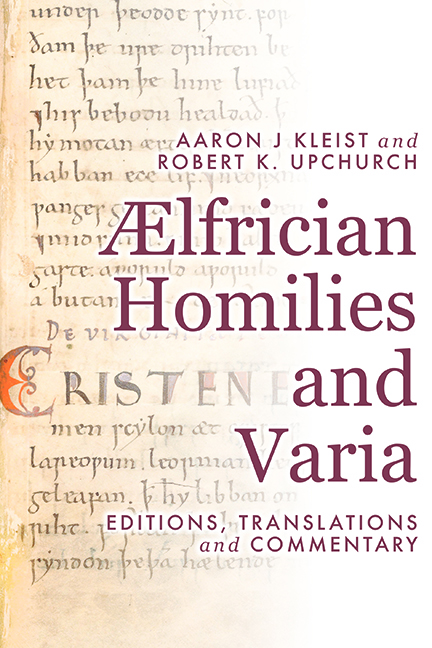Book contents
- Frontmatter
- Contents
- Preface
- Acknowledgements
- Abbreviations
- Sigla for Cited Ælfrician Manuscripts
- Dates for Cited Ælfrician Works
- Editorial Conventions
- Conventions Used in the Commentaries
- Homilies The Proper of the Season
- Homilies The Proper of the Saints
- Ælfrician Homilies and Varia: Editions, Translations, and Commentary: Volume II
- Homilies The Common of the Saints
- Homilies Unspecified Occasions
- Varia
- Works Cited
- Index
- ANGLO-SAXON TEXTS
6 - Third Sunday after Easter: Be ðam Seofanfealdan Ungifa (‘Concerning the Sevenfold Evil Gifts’)
Published online by Cambridge University Press: 05 March 2024
- Frontmatter
- Contents
- Preface
- Acknowledgements
- Abbreviations
- Sigla for Cited Ælfrician Manuscripts
- Dates for Cited Ælfrician Works
- Editorial Conventions
- Conventions Used in the Commentaries
- Homilies The Proper of the Season
- Homilies The Proper of the Saints
- Ælfrician Homilies and Varia: Editions, Translations, and Commentary: Volume II
- Homilies The Common of the Saints
- Homilies Unspecified Occasions
- Varia
- Works Cited
- Index
- ANGLO-SAXON TEXTS
Summary
Be ðam Seofanfealdan Ungifa (‘Concerning the Sevenfold Evil Gifts’) is a unique, now fragmentary, composite homily slated for the Third Sunday after Easter in the one manuscript wherein it survives. The beginning of the homily is missing, so our title is editorial and the assignment to the third Sunday conjectural, but the fragment is positioned between sermons for the second and fourth Sundays after Easter. We know for certain that Ælfric composed the component parts of the composite homily, but it is not clear if the combination is his. Peter Clemoes thinks it is. Malcolm Godden thinks it might be. John Pope says it is not. We prefer to think of it as ‘Ælfrician’ since it is at least possible that Ælfric compiled it. If so, the compilation dates to between about 1002 and 1005, by which time he had in hand the two pieces on which he drew. The first piece and the first part of the composite homily [lines 1–79] consists of Be þam Halgan Gaste (AH II.17) in its entirety. This was the Old English tract on the sevenfold good gifts of the Holy Spirit and the corresponding evil gifts of the devil that Ælfric wrote between about 998 and 1002. The second piece used for the second part of the composite homily [lines 80–151] was De doctrina apostolica (SH II.19), a non-pericope homily for an unspecified occasion about ideals of Christian conduct that Ælfric wrote between about 993 and 998. Part two consists chiefly of an exemplum about the damnation of an unrepentant thegn drawn ultimately from Bede's Ecclesiastical History and excerpted virtually verbatim from De doctrina apostolica. Be ðam Seofanfealdan Ungifa concludes with an adaptation of De doctrina apostolica's final lines, offering assurance that God will forgive those who do not lose hope in Christ's mercy and repent of their sins [lines 152–62].
Had Ælfric fashioned Be ðam Seofanfealdan Ungifa between 1002 and 1005, then he did so at a time when he was writing pericope homilies for Sundays and non-saints’ feast-days linked to Easter that would become the series known as Temporale Homilies I (TH I).
- Type
- Chapter
- Information
- Ælfrician Homilies and VariaEditions, Translations, and Commentary, pp. 353 - 372Publisher: Boydell & BrewerPrint publication year: 2022



